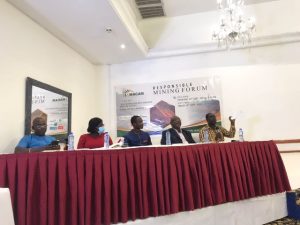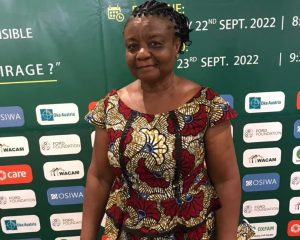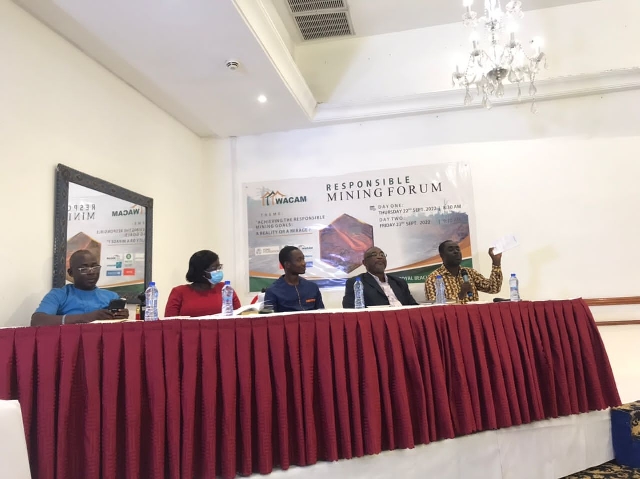Story by: Ishmael Barfi
The Associate Executive Director of WACAM, Mrs. Hannah Owusu-Koranteng has called for result oriented reforms that would advance the responsible mining agenda.
According to her, mining rather have negatively affected important sectors of the economy such as agriculture which had provided economic sustenance for majority of the Ghanaian populace.
She further stressed that, despite the importance of mining, activities of mining have created land-based conflicts and impacted negatively on agriculture.
Among them, she said, was that mining companies had used their economic and lobbying power to control compensation negotiations with vulnerable farmers resulting in the payment of compensation that did not reflect the long-term benefits of farming to people affected by the operations of multinational mining companies.

Speakers at the just ended WACAM Public Forum on Responsible Mining
The Associate Director of WACAM, Mrs. Hannah Owusu-Koranteng made this call at a two-day forum aimed at promoting responsible mining in the country.
The two-day forum held on 22-23rd September,2022 was organised by a Community based human rights and environmental mining Non-Governmental Organisation (NGO) under theme: “Achieving the Responsible Mining Goals: A Reality or Mirage”.
The forum was aimed to provide a common platform to stakeholders to discuss the current state of mining and develop concrete steps for the implementation of legal and regulatory reforms to support the responsible mining agenda.
And to provide a platform for learning and sharing with stakeholders in the mining sector on approaches and strategies in advocating for the protection of women’s rights in natural resources exploitation.

WACAM Calls for Effective & Efficient Reforms to Advance Responsible Mining
Furthermore, she indicated that, the surface mining operations had taken place in protected forests including Kubi Forest Reserves and in Ajenua Bepo Forest Reserve that served as the source of many rivers and contained plants that were new to science.
And revealed that, some mining companies had established mine pits at the headwaters of important rivers all over the country.
Touching on some of the mode operations, and beyond the economic and social displacement caused by surface mining operations, Mrs. Owusu-Koranteng explained that, the use of chemicals by these mining companies do result in cyanide spillages and pollution of rivers, thus exposing communities that continuously drink the polluted streams to cancers.
The tax incentives according to the Associate Director of WACAM, can be channeled to other uses to tackle the numerous environmental and health consequences of surface mining operations.

Associate Executive Director of WACAM, Mrs Hannah Owusu Koranteng
All these is happening as a result of weak mining laws which made it difficult to sanction defaulting mining companies, she insisted.
Holding these mining companies to responsible mining practices, she was of the view that, it would be difficult since due to the existing weak laws which prescribe weak penalties for infractions of the law, including prescribing fines as low as US$5,000.
However, on the way forward to ensure responsible mining practices, she called for the need to develop strong mining laws and strong penalties that would deter wrong mining practices in the mining sector.
Mrs. Hannah Owusu-Koranteng explained that, many children of cocoa farmers got educated from the revenues they got from agriculture and there is enough evidence in our country to support the fact farming especially cocoa farming hence the need for strong mining laws to support communities’ right to hold mining companies to the pay reasonable compensations.
Taking his turn at the forum, the Chief Executive of the Chamber of Mines, Mr. Sulemanu Koney reiterated the need for more Ghanaian participation in the mining industry explaining that it was imperative that Ghanaians, as owners of the mineral resources, invested in the mining sector to accrue the needed benefits.
In this regard, he advocated that the Akwatia Mines, which had been dormant due to lack of investments, be listed on the stock exchange to enable Ghanaians invest in it.
He said despite the importance of foreign direct investments in the country, it was critical that Ghanaians own and benefits more from the mineral resources to create wealth.

WACAM Calls for Effective & Efficient Reforms to Advance Responsible Mining
Mining companies, Mr. Koney noted, were committed to supporting government’s economic recovery efforts in addition to other obligations to help Ghana’s development.
For him, the Director of Finance for the Ghana National Association of Small Scale Miners (GNASSM), Mr. Francis Opoku, there is the need for enhanced enforcement to clamp down on illegal mining which had led to the pollution of water bodies and degradation of forest reserves.
Deputy Director in charge of Small Scale Mining, Minerals Commission, Samuel Tika, said the Commission was reviewing some of the mining regulations to strengthen enforcement and ensuring efficient and effective monitoring of the mining sector.
Majority of the participants present at the two-day forum was in agreement to regulate and enforce the numerous laws with regards to the mining sector.
Therefore called on relevant agencies in the sector to protect the mining communities from mining companies that abuses their human rights and deprive them of their compensations and other social amenities.
The forum brought together gender and environmental activists, legal practitioners, representatives from the Minerals and Forestry Commissions, academia, the media, women in law and civil society organisations and women affected by mining activities.
Source: www.thenewindependentonline.com








